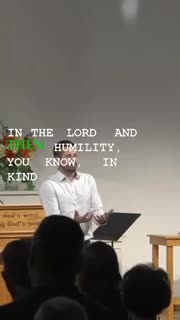Embracing True Humility and Generosity in Christ
Devotional
Sermon Summary
Bible Study Guide
Sermon Clips
### Quotes for Outreach
1. "As always, we don't claim to have a perfect church, we just claim to have a perfect God, and I know you're going to meet him here today, because we're going to open up the Word of God, and we're going to sing songs that give him glory and praise, and so I'm excited. Wherever you are coming from, however you kind of feel sitting at your personal walk with Jesus, I know he's going to meet you where you are." [07:50] (20 seconds)
2. "He doesn't require some type of special performance. He doesn't require anything of you. He just comes, and he longs to be in your life. He longs for a relationship with you, and wherever you're at, perfection, which none of us are, or just had a sloppy week, God's going to enter in. He wants to speak into that, and he wants to be a part of it, and so I'm glad you're here." [08:20] (20 seconds)
3. "Christ calls you his masterpiece. He cherishes you. You are his new creation which he's redeemed and who he loves. And instead we kind of just treat ourselves like junk. And we're like, Lord, here I am again. Here's what, you know, I've screwed this up. Or this is such a mess. I just... And today, maybe it's time to confess that part. That are fearfully and wonderfully made. God says to you, you are a child that was worth dying for." [20:16] (36 seconds)
4. "Christ hears your confession and he does not stay quiet. For he longs for you to be refreshed and renewed. And he renews you with these words this morning. Child, you are forgiven. In the name of the Father, Son, and Holy Spirit. He washes you again. He cleanses you again. He forgives you again. And he loves you. Walk in forgiveness and the truth of who you are to him. Because you are loved. And you are valuable. And he longs to continue to use you. That's the truth. Believe it." [22:46] (60 seconds)
5. "We give generously because we have a generous God who became poor so that we could become rich. And now we have our earthly riches that don't come close to the spiritual riches we have, and we get to give that to folks and give that away, and we get to give that away to ministries that have an effect on people of the world that can actually have eternal impact." [52:01] (21 seconds)
### Quotes for Members
1. "There's so much in our Christian walk that kind of needs to go down the center. And instead we kind of flip from one ditch to the other. And one of those things is humility and pride. And sometimes it's so hard to kind of have confidence in the right things. Confidence in the Lord. And then humility, you know, in kind of the lack of what we're able to do. Or humility of what's been accomplished through us." [18:57] (60 seconds)
2. "Paul says in verse 1, We want you to know, brothers, about the grace of God that has been given among the churches of Macedonia. So Jerusalem was being persecuted, and the church in Jerusalem had many needs at this time. Now the church in Macedonia was pretty poor. They didn't have a lot of money or funds or resources. Yet this little church in Macedonia gave everything. Everything they could towards the church in Jerusalem." [33:05] (30 seconds)
3. "First and foremost, we give ourselves completely to the Lord. Lord, here is my life. Here is my body. Here is my gifts. Here is my abilities. Here is my breath. Here is my finances. This is my entire life. It's all for you. Use it how you will. Your will be done in my life. After all, you've died for me. You've given us all that's truly important. You've given us forgiveness. These things that are far more valuable than money could ever be." [36:15] (29 seconds)
4. "When unexpected circumstances come up in life, or from the verse of Jeremiah, when life heats up, is your first thought, it's okay because we have enough money for this? Or is your first thought, it's going to be all right because the Lord has us? I'm not saying that we shouldn't plan ahead or prepare or have emergency funds. There's godly wisdom in all that. I'm just saying that our trust shouldn't be more in our accounts than in the Lord." [44:32] (36 seconds)
5. "Giving flows out of a person who knows they are loved and provided for by God, and then we just can freely give, because it's like, I know the Lord's got us covered, and so, Lord, you've given me all of this stuff, and so, Lord, how can I use it for your glory? I know, I mean, everything I have is from you. So I know that, like, you've given me so much already. How can I give it back to you? It flows out of the abundance we have in Christ." [45:32] (28 seconds)
Ask a question about this sermon
1. "As always, we don't claim to have a perfect church, we just claim to have a perfect God, and I know you're going to meet him here today, because we're going to open up the Word of God, and we're going to sing songs that give him glory and praise, and so I'm excited. Wherever you are coming from, however you kind of feel sitting at your personal walk with Jesus, I know he's going to meet you where you are." [07:50] (20 seconds)
2. "He doesn't require some type of special performance. He doesn't require anything of you. He just comes, and he longs to be in your life. He longs for a relationship with you, and wherever you're at, perfection, which none of us are, or just had a sloppy week, God's going to enter in. He wants to speak into that, and he wants to be a part of it, and so I'm glad you're here." [08:20] (20 seconds)
3. "Christ calls you his masterpiece. He cherishes you. You are his new creation which he's redeemed and who he loves. And instead we kind of just treat ourselves like junk. And we're like, Lord, here I am again. Here's what, you know, I've screwed this up. Or this is such a mess. I just... And today, maybe it's time to confess that part. That are fearfully and wonderfully made. God says to you, you are a child that was worth dying for." [20:16] (36 seconds)
4. "Christ hears your confession and he does not stay quiet. For he longs for you to be refreshed and renewed. And he renews you with these words this morning. Child, you are forgiven. In the name of the Father, Son, and Holy Spirit. He washes you again. He cleanses you again. He forgives you again. And he loves you. Walk in forgiveness and the truth of who you are to him. Because you are loved. And you are valuable. And he longs to continue to use you. That's the truth. Believe it." [22:46] (60 seconds)
5. "We give generously because we have a generous God who became poor so that we could become rich. And now we have our earthly riches that don't come close to the spiritual riches we have, and we get to give that to folks and give that away, and we get to give that away to ministries that have an effect on people of the world that can actually have eternal impact." [52:01] (21 seconds)
### Quotes for Members
1. "There's so much in our Christian walk that kind of needs to go down the center. And instead we kind of flip from one ditch to the other. And one of those things is humility and pride. And sometimes it's so hard to kind of have confidence in the right things. Confidence in the Lord. And then humility, you know, in kind of the lack of what we're able to do. Or humility of what's been accomplished through us." [18:57] (60 seconds)
2. "Paul says in verse 1, We want you to know, brothers, about the grace of God that has been given among the churches of Macedonia. So Jerusalem was being persecuted, and the church in Jerusalem had many needs at this time. Now the church in Macedonia was pretty poor. They didn't have a lot of money or funds or resources. Yet this little church in Macedonia gave everything. Everything they could towards the church in Jerusalem." [33:05] (30 seconds)
3. "First and foremost, we give ourselves completely to the Lord. Lord, here is my life. Here is my body. Here is my gifts. Here is my abilities. Here is my breath. Here is my finances. This is my entire life. It's all for you. Use it how you will. Your will be done in my life. After all, you've died for me. You've given us all that's truly important. You've given us forgiveness. These things that are far more valuable than money could ever be." [36:15] (29 seconds)
4. "When unexpected circumstances come up in life, or from the verse of Jeremiah, when life heats up, is your first thought, it's okay because we have enough money for this? Or is your first thought, it's going to be all right because the Lord has us? I'm not saying that we shouldn't plan ahead or prepare or have emergency funds. There's godly wisdom in all that. I'm just saying that our trust shouldn't be more in our accounts than in the Lord." [44:32] (36 seconds)
5. "Giving flows out of a person who knows they are loved and provided for by God, and then we just can freely give, because it's like, I know the Lord's got us covered, and so, Lord, you've given me all of this stuff, and so, Lord, how can I use it for your glory? I know, I mean, everything I have is from you. So I know that, like, you've given me so much already. How can I give it back to you? It flows out of the abundance we have in Christ." [45:32] (28 seconds)










